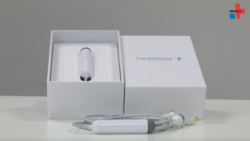mHealth
In medicine
mHealth: Mobile health solutions & applications
What is mHealth?

mHealth refers to the use of mobile devices in medical care. As shown in the picture, these can be applications on the tablet that receive and store data from wearables or other sensors.
Mobile health technologies and applications

The mobile application of diagnostic procedures is another area of use for mHealth.
Articles from our magazine about mHealth
Areas of application for mHealth
Prevention, early detection and more: staying healthy with mHealth

Among other things, apps support treatment adherence - like this app that helps with taking medication correctly.
How and where mHealth helps with recovery

The combination of wearables and health apps on the smartphone is versatile.
Prerequisites for mHealth success

mhealth devices allow patients to monitor their own health regularly and easily.

In addition to preventive healthcare and supporting therapies, mHealth applications can also help with performance diagnostics, for example.
Goals & benefits of mobile health

Advantages of technologies in mHealth: greater efficiency, easier accessibility, better prevention and patient care.



















